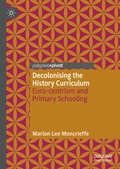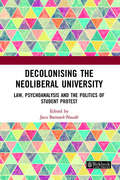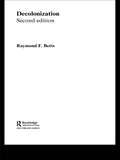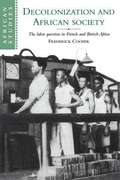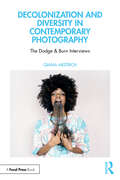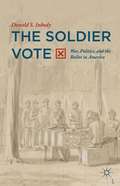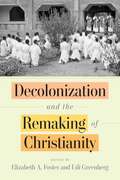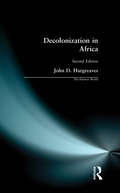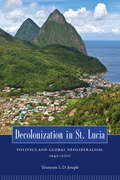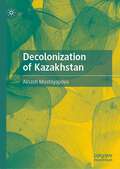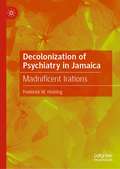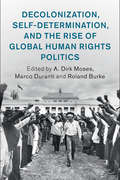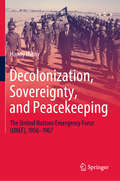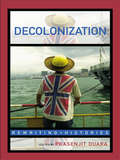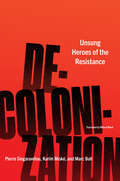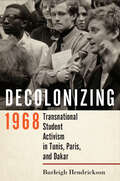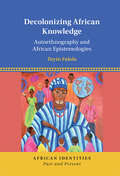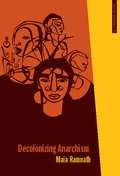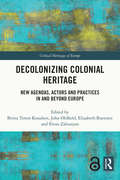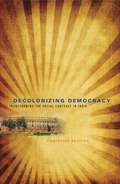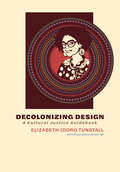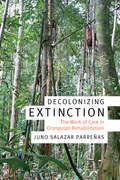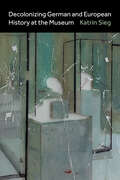- Table View
- List View
Decolonising the History Curriculum: Euro-centrism and Primary Schooling
by Marlon Lee MoncrieffeThis book calls for a reconceptualisation and decolonisation of the Key Stage 2 national history curriculum. The author applies a range of theories in his research with White-British primary school teachers to show how decolonising the history curriculum can generate new knowledge for all, in the face of imposed Eurocentric starting points for teaching and learning in history, and dominant white-cultural attitudes in primary school education. Through both narrative and biographical methodologies, the author presents how teaching and learning Black-British history in schools can be achieved, and centres his Black-British identity and minority-ethnic group experience alongside the immigrant Black-Jamaican perspective of his mother to support a framework of critical thinking of curriculum decolonisation. This book illustrates the potential of transformative thinking and action that can be employed as social justice for minority-ethnic group children who are marginalized in their educational development and learning by the dominant discourses of British history, national building and national identity.
Decolonising the Neoliberal University: Law, Psychoanalysis and the Politics of Student Protest
by Jaco Barnard-NaudéTaking the postcolonial – or, more specifically, the post-apartheid – university as its focus, the book takes the violence and the trauma of the global neoliberal hegemony as its central point of reference. Following a primarily psychoanalytic line of enquiry, it engages a range of disciplines – law, philosophy, literature, gender studies, cultural studies and political economy – in order better to understand the conditions of possibility of an emancipatory, or decolonised, higher education. And this in the context of both the inter-generational transmission of the trauma of colonialism, on the one hand, and, on the other, the trauma of neoliberal subjectivity in the postcolonial university. Oriented around an important lecture by Jacqueline Rose, the volume contains contributions from world-renowned authors, such as Judith Butler and Achille Mbembe, as well as numerous legal and other theorists who share their concern with interrogating the contemporary crisis in higher education. This truly interdisciplinary collection will appeal to a wide range of readers right across the humanities, but especially those with substantial interests in the contemporary state of the university, as well as those with theoretical interests in postcolonialism, psychoanalysis, gender studies, cultural studies, jurisprudence and law.
Decolonization
by Raymond BettsRaymond F. Betts considers the 'process' of decolonization and the outcomes which have left a legacy of problems, drawing on numerous examples including Ghana, India, Rwanda and Hong Kong. He examines: the effects of the two World Wars on the colonial empire the expectations and problems created by independence the major demographic shifts accompanying the end of the empire the cultural experiences, literary movements, and the search for ideology of the dying empire and the newly independent nations. With an annotated bibliography and a chronology of political decolonization, Decolonization gives a concise, original and multi-disciplinary introduction to this controversial theme and analyzes what the future holds beyond the empire.
Decolonization and African Society: The Labor Question In French and British Africa (African Studies #89)
by Frederick CooperThis detailed and authoritative volume changes our conceptions of 'imperial' and 'African' history. The author gathers a vast range of archival sources in French and English to achieve a truly comparative study of colonial policy toward the recruitment, control, and institutionalization of African labor forces from the mid 1930s, when the labor question was first posed, to the late 1950s, when decolonization was well under way. The author explores colonial conceptions of the African worker and shows how African trade union and political leaders used the new language of social change to claim equality and a share of power. This helped to persuade European officials that the 'modern' Africa they imagined was unaffordable. Britain and France could not reshape African society. As they left the continent, the question was how they had affected the ways in which Africans could reorganize society themselves.
Decolonization and Diversity in Contemporary Photography: The Dodge & Burn Interviews
by Qiana MestrichFocusing on fine art and documentary photography, this book provides a racially diverse and culturally inclusive version of photography history and its contemporary manifestations.Who’s documenting the evolution of photography as it is happening now from an inclusive, transnational perspective? This is the challenge this book aims to address. The collection is the print manifestation of the Dodge and Burn art photography blog actively published from 2007 to 2018, including a selection of 35 interviews with photographers and art professionals from underrepresented communities—those of African, Asian, Latinx/é and Native American heritage. It captures fascinating accounts of artists of color and the broad range of their challenges and successes: aspirations, photo series and photobooks, earning a living, discrimination, photography education, photographic practice, socio-political conversations, and more.Decolonization and Diversity in Contemporary Photography is a powerful collection that celebrates and exhibits the talents of underrepresented artists. It is essential reading for both photography students and aspiring photographers.
Decolonization and the French of Algeria: Bringing The Settler Colony Home (Cambridge Imperial and Post-Colonial Studies Series)
by Sung-Eun ChoiIn 1962, almost one million people were evacuated from Algeria. France called these citizens Repatriates to hide their French Algerian origins and to integrate them into society. This book is about Repatriation and how it became central to France's postcolonial understanding of decolonization, the Algerian past, and French identity.
Decolonization and the Remaking of Christianity
by Elizabeth A. Foster and Udi GreenbergIn the decades following the era of decolonization, global Christianity experienced a seismic shift. While Catholicism and Protestantism have declined in their historic European strongholds, they have sustained explosive growth in Asia, Latin America, and Africa. This demographic change has established Christians from the Global South as an increasingly dominant presence in modern Christian thought, culture, and politics.Decolonization and the Remaking of Christianity unearths the roots of this development, charting the metamorphosis of Christian practice and institutions across five continents throughout the pivotal years of decolonization. The essays in this collection illustrate the diverse new ideas, rituals, and organizations created in the wake of Western imperialism’s formal collapse and investigate how religious leaders, politicians, theologians, and lay people debated and shaped a new Christianity for a postcolonial world.Contributors argue that the collapse of colonialism and broader cultural challenges to Western power fostered new organizations, theologies, and political engagements across the world, ultimately setting Christianity on its current trajectory away from its colonial heritage. These essays interrogate decolonization’s varied and conflicting impacts on global Christianity, while also providing a novel framework for rethinking decolonization’s modern legacies. Taken together, this book charts the relationship between decolonization and Christianity on a truly global scale.Contributors: Joel Cabrita, Darcie Fontaine, Elizabeth A. Foster, Udi Greenberg, David Kirkpatrick, Eric Morier-Genoud, Phi-Vân Nguyen, Justin Reynolds, Sarah Shortall, Lydia Walker, Charlotte Walker-Said, Albert Wu, Gene Zubovich.
Decolonization in Africa (The Postwar World)
by John D. HargreavesJohn Hargreaves examines how the British, French, Belgian, Spanish and Portuguese colonies in tropical Africa became independent in the postwar years, and in doing so transformed the international landscape. African demands for independence and colonial plans for reform - central to the story - are seen here in the wider context of changing international relationships.
Decolonization in St. Lucia: Politics and Global Neoliberalism, 1945–2010 (Caribbean Studies Series)
by Tennyson S. JosephTennyson S. D. Joseph builds upon current research on the anticolonial and nationalist experience in the Caribbean. He explores the impact of global transformation upon the independent experience of St. Lucia and argues that the island's formal decolonization roughly coincided with the period of the rise of global neoliberalism hegemony. Consequently, the concept of “limited sovereignty” became the defining feature of St. Lucia's understanding of the possibilities of independence. Central to the analysis is the tension between the role of the state as a facilitator of domestic aspirations on one hand and a facilitator of global capital on the other. Joseph examines six critical phases in the St. Lucian experience. The first is 1940 to 1970, when the early nationalist movement gradually occupied state power within a framework of limited self-government. The second period is 1970 to 1982 during which formal independence was attained and an attempt at socialist-oriented radical nationalism was pursued by the St. Lucia Labor Party. The third distinctive period was the period of neoliberal hegemony, 1982-1990. The fourth period (1990-1997) witnessed a heightened process of neoliberal adjustment in global trade which destroyed the banana industry and transformed the domestic political economy. A later period (1997-2006) involved the SLP's return to political power, resulting in tensions between an earlier radicalism and a new and contradictory accommodation to global neoliberalism. The final period (2006-2010) coincides with the onset of a crisis in global neoliberalism during which a series of domestic conflicts reflected the contradictions of the dominant understanding of sovereignty in narrow, materialist terms at the expense of its wider anti-systematic, progressive, and emancipator connotations.
Decolonization of Kazakhstan
by Ainash MustoyapovaThis book is devoted to the problem of the decolonization of Kazakhstan, which is considered in the framework of postcolonial studies. The author raises issues of identity, historical and socio-cultural heritage of nomads. In addition, the book examines and destroys colonial and Soviet myths and stereotypes concerning the history, lifestyle and traditions of the Kazakhs. Considering that imperial sentiments are increasing in Russia (as a former metropolis), the process of decolonization seems to be urgently necessary for Kazakhstan. And this process is beginning to develop actively. This fascinating polemic will interest historians, scholars trying to understand the former Soviet space, and scholars of Eurasia.
Decolonization of Psychiatry in Jamaica: Madnificent Irations
by Frederick W. HicklingThis book traces the historical postcolonial journey of four generations of Jamaican psychiatrists challenging the European colonial ‘civilizing mission’ of psychiatric care. It details the process of deinstitutionizing patients with chronic mental illness using psychohistoriographic cultural therapy, by engaging them in creating sociodrama and poetry writing, not only to express and reverse the stigma contributing to their marginalized status, but also to reconnect them to a centuries-long history of oppression. The author thereby demonstrates that psychological decolonization requires a seminal understanding of the complex mental inter-relationship between slaves and slaveowners. Further, it is shown how the model analyzes the antipodal dialectic history of descendants of Africans enslaved in the New World by brutish British Imperialists suffering from the European psychosis of white supremacy. Drawing together a detailed description of the sociopoem Madnificent Irations, with an examination of Jamaica’s political and social history, and the author’s personal experience, this compelling work marks an important contribution to decolonial literature. It will be of particular interest to students and scholars of postcolonial studies, critical race theory, the history of psychology and community psychology.
Decolonization, Self-Determination, and the Rise of Global Human Rights Politics (Human Rights in History)
by Roland BurkeThis volume presents the first global history of human rights politics in the age of decolonization. The conflict between independence movements and colonial powers shaped the global human rights order that emerged after the Second World War. It was also critical to the genesis of contemporary human rights organizations and humanitarian movements. Anti-colonial forces mobilized human rights and other rights language in their campaigns for self-determination. In response, European empires harnessed the new international politics of human rights for their own ends, claiming that their rule, with its promise of 'development,' was the authentic vehicle for realizing them. Ranging from the postwar partitions and the wars of independence to Indigenous rights activism and post-colonial memory, this volume offers new insights into the history and legacies of human rights, self-determination, and empire to the present day.
Decolonization, Sovereignty, and Peacekeeping: The United Nations Emergency Force (UNEF), 1956–1967
by Hanny HilmyThis book analyses three major themes: decolonization, sovereignty, and peacekeeping. Their interaction during the national liberation struggle during the Cold War, culminating in the 1956 Suez War, addresses the principle of national sovereignty after World War II in the framework of the UN Charter. The new peacekeeping operations were used in many conflicts, during which the Charter’s theory and application were tested. The rise of the USA as the key Western power and Israel’s special role in the Middle East have created a new confrontational dynamic for the entire region. The interaction between the book’s main themes in the field has led to the principles of peacekeeping in international and national conflicts being reviewed in light of the discredited ‘Capstone Doctrine’. The author argues that state sovereignty is sacrosanct, but humanitarian interventions are equally imperative in his view. Striking the right balance is crucial for managing conflicts. The author:· offers a well-informed historical account and an authoritative political analysis· was exposed to UNEF deployments and termination and knows key peacekeeping actors· draws on original documents, memoirs, and interviews· includes unpublished photos and previously unavailable documentary material · has experience in government and academia
Decolonization: A Short History
by Jeremiah Riemer Jürgen Osterhammel Jan C. JansenThe end of colonial rule in Asia, Africa, and the Caribbean was one of the most important and dramatic developments of the twentieth century. In the decades after World War II, dozens of new states emerged as actors in global politics. Long-established imperial regimes collapsed, some more or less peacefully, others amid mass violence. This book takes an incisive look at decolonization and its long-term consequences, revealing it to be a coherent yet multidimensional process at the heart of modern history.Jan Jansen and Jürgen Osterhammel trace the decline of European, American, and Japanese colonial supremacy from World War I to the 1990s. Providing a comparative perspective on the decolonization process, they shed light on its key aspects while taking into account the unique regional and imperial contexts in which it unfolded. Jansen and Osterhammel show how the seeds of decolonization were sown during the interwar period and argue that the geopolitical restructuring of the world was intrinsically connected to a sea change in the global normative order. They examine the economic repercussions of decolonization and its impact on international power structures, its consequences for envisioning world order, and the long shadow it continues to cast over new states and former colonial powers alike.Concise and authoritative, Decolonization is the essential introduction to this momentous chapter in history, the aftershocks of which are still being felt today.
Decolonization: Perspectives from Now and Then (Rewriting Histories)
by Prasenjit DuaraDecolonization brings together the most cutting-edge thinking by major historians of decolonization, including previously unpublished essays and writings by leaders of decolonizing countries including Ho Chi-Minh and Jawaharlal Nehru. The chapters in this volume present a move away from Western analysis of decolonizaton and instead move towards the angle of vision of the former colonies. This is a ground-breaking study of a subject central to recent global history.
Decolonization: Unsung Heroes of the Resistance
by Karim Miské Pierre Singaravélou Marc BallFull of gripping historical vignettes and evocative photographs, an accessible overview of the dynamic figures who resisted colonization, from India, Senegal, and Algeria to Vietnam, Kenya, and Congo.Decolonization started on the very first day of colonization. From the arrival of the Europeans, the peoples of Africa and Asia rose up. No one willingly accepts subjugation, but in order to one day regain freedom, you first and foremost need to stay alive. Faced with the Europeans&’ machine guns, the colonized hit back in other ways: from civil disobedience to communist revolution, by way of soccer and literature. It was a struggle marked by infinite patience and unlimited determination, fought by heroic men and women now largely unknown. Condensing a wealth of scholarly research into short, lively chapters, Decolonization brings their extraordinary stories to light: Manikarnika Tambe, the Indian queen who led her troops into battle against the British; Mary Nyanjiru, the Kenyan activist who spearheaded a protest in Nairobi; Lamine Senghor, the Senegalese infantryman who became an anti-colonial militant in Paris; and many more. With them, a current of resistance swept the world, culminating in the independence of almost all the colonies in the 1960s. But at what price? In the atomic India of Indira Gandhi, in the Congo subjected to Mobutu&’s dictatorship, or in a London shaken by the rioting of young immigrants, we can see just how crucial it is that we understand and learn from this painful history.
Decolonizing 1968: Transnational Student Activism in Tunis, Paris, and Dakar
by Burleigh HendricksonDecolonizing 1968 explores how activists in 1968 transformed university campuses across Europe and North Africa into sites of contestation where students, administrators, and state officials collided over definitions of modernity and nationhood after empire. Burleigh Hendrickson details protesters' versions of events to counterbalance more visible narratives that emerged from state-controlled media centers and ultimately describes how the very education systems put in place to serve the French state during the colonial period ended up functioning as the crucible of postcolonial revolt. Hendrickson not only unearths complex connections among activists and their transnational networks across Tunis, Paris, and Dakar but also weaves together their overlapping stories and participation in France's May '68.Using global protest to demonstrate the enduring links between France and its former colonies, Decolonizing 1968 traces the historical relationships between colonialism and 1968 activism, examining transnational networks that emerged and new human and immigrants' rights initiatives that directly followed. As a result, Hendrickson reveals that 1968 is not merely a flashpoint in the history of left-wing protest but a key turning point in the history of decolonization.Thanks to generous funding from Penn State and its participation in TOME (Toward an Open Monograph Ecosystem), the ebook editions of this book are available as Open Access volumes from Cornell Open (cornellpress.cornell.edu/cornell-open) and other repositories.
Decolonizing African Knowledge: Autoethnography and African Epistemologies (African Identities: Past and Present)
by Toyin FalolaAddressing the consequences of European slavery, colonialism, and neo-colonialism on African history, knowledge and its institutions, this innovative book applies autoethnography to the understanding of African knowledge systems. Considering the 'Self' and Yoruba Being (the individual and the collective) in the context of the African decolonial project, Falola strips away Eurocentric influences and interruptions from African epistemology. Avoiding colonial archival sources, it grounds itself in alternative archives created by memory, spoken words, images and photographs to look at the themes of politics, culture, nation, ethnicity, satire, poetics, magic, myth, metaphor, sculpture, textiles, hair and gender. Vividly illustrated in colour, it uses diverse and novel methods to access an African way of knowing. Exploring the different ways that a society understands and presents itself, this book highlights convergence, enmeshing private and public data to provide a comprehensive understanding of society, public consciousness, and cultural identity.
Decolonizing Anarchism
by Maia RamnathDecolonizing Anarchism looks at the history of South Asian struggles against colonialism and neocolonialism, highlighting lesser-known dissidents as well as iconic figures. This approach reveals an alternate narrative of decolonization, in which achieving a nation-state is not the objective. Maia Ramnath also studies the anarchist vision of alternate society, which closely echoes the concept of total decolonization on the political, economic, social, cultural, and psychological planes. This facilitates not only a reinterpretation of the history of anticolonialism, but insight into the meaning of anarchism itself. Maia Ramnath teaches at New York University and is a board member of the Institute for Anarchist Studies.
Decolonizing Colonial Heritage: New Agendas, Actors and Practices in and beyond Europe (Critical Heritages of Europe)
by Britta Timm Knudsen Elizabeth Buettner John Oldfield Elvan ZabunyanDecolonizing Colonial Heritage explores how different agents practice the decolonization of European colonial heritage at European and extra-European locations. Assessing the impact of these practices, the book also explores what a new vision of Europe in the postcolonial present could look like. Including contributions from academics, artists and heritage practitioners, the volume explores decolonial heritage practices in politics, contemporary history, diplomacy, museum practice, the visual arts and self-generated memorial expressions in public spaces. The comparative focus of the chapters includes examples of internal colonization in Europe and extends to former European colonies, among them Shanghai, Cape Town, and Rio de Janeiro. Examining practices in a range of different contexts, the book pays particular attention to sub-national actors whose work is opening up new futures through their engagement with decolonial heritage practices in the present. The volume also considers the challenges posed by applying decolonial thinking to existing understandings of colonial heritage. Decolonizing Colonial Heritage examines the role of colonial heritage in European memory politics and heritage diplomacy. It will be of interest to academics and students working in the fields of heritage and memory studies, colonial and imperial history, European studies, sociology, cultural studies, development studies, museum studies, and contemporary art.
Decolonizing Democracy: Transforming the Social Contract in India
by Christine KeatingMost democratic theorists have taken Western political traditions as their primary point of reference, although the growing field of comparative political theory has shifted this focus. In Decolonizing Democracy, comparative theorist Christine Keating interprets the formation of Indian democracy as a progressive example of a “postcolonial social contract.” In doing so, she highlights the significance of reconfigurations of democracy in postcolonial polities like India and sheds new light on the social contract, a central concept within democratic theory from Locke to Rawls and beyond. Keating’s analysis builds on the literature developed by feminists like Carole Pateman and critical race theorists like Charles Mills that examines the social contract’s egalitarian potential. By analyzing the ways in which the framers of the Indian constitution sought to address injustices of gender, race, religion, and caste, as well as present-day struggles over women’s legal and political status, Keating demonstrates that democracy’s social contract continues to be challenged and reworked in innovative and potentially more just ways.
Decolonizing Democracy: Transforming the Social Contract in India
by Christine KeatingMost democratic theorists have taken Western political traditions as their primary point of reference, although the growing field of comparative political theory has shifted this focus. In Decolonizing Democracy, comparative theorist Christine Keating interprets the formation of Indian democracy as a progressive example of a “postcolonial social contract.” In doing so, she highlights the significance of reconfigurations of democracy in postcolonial polities like India and sheds new light on the social contract, a central concept within democratic theory from Locke to Rawls and beyond. Keating’s analysis builds on the literature developed by feminists like Carole Pateman and critical race theorists like Charles Mills that examines the social contract’s egalitarian potential. By analyzing the ways in which the framers of the Indian constitution sought to address injustices of gender, race, religion, and caste, as well as present-day struggles over women’s legal and political status, Keating demonstrates that democracy’s social contract continues to be challenged and reworked in innovative and potentially more just ways.
Decolonizing Design: A Cultural Justice Guidebook
by Elizabeth (Dori) TunstallA guidebook to the institutional transformation of design theory and practice by restoring the long-excluded cultures of Indigenous, Black, and People of Color communities.From the excesses of world expositions to myths of better living through technology, modernist design, in its European-based guises, has excluded and oppressed the very people whose lands and lives it reshaped. Decolonizing Design first asks how modernist design has encompassed and advanced the harmful project of colonization—then shows how design might address these harms by recentering its theory and practice in global Indigenous cultures and histories.A leading figure in the movement to decolonize design, Dori Tunstall uses hard-hitting real-life examples and case studies drawn from over fifteen years of working to transform institutions to better reflect the lived experiences of Indigenous, Black, and People of Color communities. Her book is at once enlightening, inspiring, and practical, interweaving her lived experiences with extensive research to show what decolonizing design means, how it heals, and how to practice it in our institutions today.For leaders and practitioners in design institutions and communities, Tunstall&’s work demonstrates how we can transform the way we imagine and remake the world, replacing pain and repression with equity, inclusion, and diversity—in short, she shows us how to realize the infinite possibilities that decolonized design represents.
Decolonizing Extinction: The Work of Care in Orangutan Rehabilitation (Experimental Futures)
by Juno Salazar ParreñasIn Decolonizing Extinction Juno Salazar Parreñas ethnographically traces the ways in which colonialism, decolonization, and indigeneity shape relations that form more-than-human worlds at orangutan rehabilitation centers on Borneo. Parreñas tells the interweaving stories of wildlife workers and the centers' endangered animals while demonstrating the inseparability of risk and futurity from orangutan care. Drawing on anthropology, primatology, Southeast Asian history, gender studies, queer theory, and science and technology studies, Parreñas suggests that examining workers’ care for these semi-wild apes can serve as a basis for cultivating mutual but unequal vulnerability in an era of annihilation. Only by considering rehabilitation from perspectives thus far ignored, Parreñas contends, could conservation biology turn away from ultimately violent investments in population growth and embrace a feminist sense of welfare, even if it means experiencing loss and pain.
Decolonizing German and European History at the Museum (Social History, Popular Culture, And Politics In Germany)
by Katrin SiegDecolonizing German and European History at the Museum examines efforts by European museums to investigate colonialism as part of an unprocessed past, confront its presence, and urge repair. A flurry of exhibitions and the overhaul of numerous large museums in the last decade signal that an emergent colonial memory culture is now reaching broader publics. Exhibitions pose the question of what Europeans owe to those they colonized. Decolonizing German and European History at the Museum shows how museums can help visitors mourn historic violence and identify the contemporary agents, beneficiaries, victims, survivors, and resisters of colonial presence. At the same time, the book treats the museum as part of the racialized power relations that activists, academics, and artists have long protested against. This book asks whether museums have made the dream of activists, academics, and artists to build equitable futures more acceptable and more durable—or whether in packaging that dream for general audiences they curtail it. Confronting colonial violence, this book argues, pushes Europeans to face the histories of racism and urges them to envision antiracism at the global scale.
